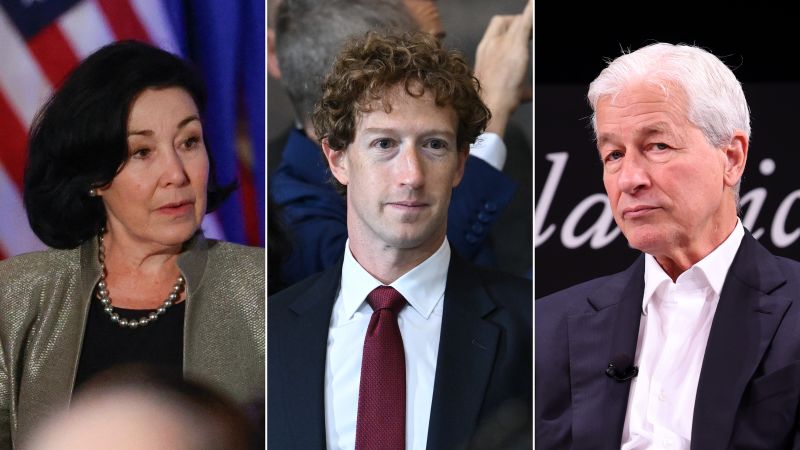In the current economic landscape, a noteworthy trend has emerged among some of America’s wealthiest business leaders. Since the beginning of the year, these prominent figures have witnessed significant declines in their net worth, losing millions, if not billions, of dollars. This downturn may be attributed to several factors, including the repercussions of former President Donald Trump’s policies, particularly his tariff announcements. However, some executives managed to mitigate these losses through timely decision-making, offloading substantial portions of their stock before the tariffs were publicized. This strategic shift is emblematic of how wealthier investors often navigate their portfolios differently than the average individual investor.
Among the top executives making waves in stock sales is Meta’s CEO, Mark Zuckerberg. Alongside him are Tech giant Oracle’s CEO Safra Catz and JPMorgan Chase’s CEO Jamie Dimon. According to data compiled by The Washington Service—a provider of insights into corporate trading—these executives ranked among the top ten stock sellers in terms of value during the first quarter of the year. Their actions preemptively culminated in a collective sale of over 28 million shares, amounting to an impressive total of $3.9 billion.
This wave of selling came just before a notable market decline, triggered by President Trump’s announcement in early April about sweeping tariff hikes aimed at the United States’ trading partners. While some of the proposed tariffs have fluctuated and experienced pushback, the market remains rife with uncertainty, leading to continued volatility.
Notably, the timing of the significant stock sales stands out. Although executives often follow scheduled plans for selling shares, there is no evidence to suggest that any of these top sellers were attempting to preemptively react to the ominous tariff announcement. Nevertheless, their prompt actions resulted in comparatively lesser financial losses than they would have faced had they conducted their sales weeks post-announcement.
Taking a closer look, Zuckerberg’s decision to sell 1.1 million shares worth approximately $733.5 million came during January and February, when shares of Meta were primarily trading above the $600 mark. However, as of a recent market inspection, Meta shares have dropped to around $530, reflecting a decline of about 11% year-to-date. This sharp decrease contributed to a staggering nearly $30 billion erosion in Zuckerberg’s net worth since the start of 2023, according to the Bloomberg Billionaires Index. It is significant to note that, despite the drop, Zuckerberg still retains ownership of more than 342 million shares of Meta, equating to roughly 13% of the total stock.
The stark decline in Zuckerberg’s wealth stands out particularly against the backdrop of his efforts to establish robust relations with Trump. In his endeavor to align with the former president, Zuckerberg donated to Trump’s inauguration and partook in a $25 million settlement related to a lawsuit Trump filed after the suspension of his account following the January 6 Capitol riots, of which a significant portion is earmarked for a future presidential library for Trump.
Catz, meanwhile, sold approximately 3.8 million dollars in Oracle shares, amounting to around $705 million, as per The Washington Service. As a reflection of market trends, Oracle’s stock has plummeted nearly 19% since the year’s beginning. Similarly, Jamie Dimon offloaded over 860,000 shares of JPMorgan Chase, valued at $233.8 million. Dimon has previously issued warnings regarding the potential for a recession stemming from Trump’s trade policies.
In addition to these three prominent figures, the list of top ten insider sellers based on share value in the first quarter includes significant names such as Palo Alto Networks CEO Nikesh Arora, Nutanix Director Max de Groen, Axis Capital Holdings Director Charles Davis, Palantir President Stephen Cohen, Tempus AI CEO Eric Lefkofsky, Netflix Co-CEO Ted Sarandos, and Dutch Bros CEO Travis Boersma. These high-profile stock trades underpin the broader narrative of economic uncertainty and the strategic maneuvers made by corporate executives in response to shifting economic policies and market conditions.



